Greetings, fruit enthusiasts! Today, I’m excited to dive into the delightful world of fruits with one seed. These single-seeded fruits come in a wide range of shapes, sizes, and flavors, making them a favorite among fruit lovers. From juicy berries to succulent stone fruits, there’s something for everyone to enjoy.
When it comes to fruits with one seed, the options are endless. Imagine sinking your teeth into a sweet and creamy banana or biting into a burst of flavor from plump grapes. Not to mention the versatility of tomatoes, which can be enjoyed in salads, sauces, or as a standalone snack. These fruits with single seeds bring a unique blend of taste and nutrition to your plate.
In this article, we will explore the fascinating variety of fruits with one seed, their botanical classification, unique characteristics, and the crucial role they play in plant reproduction. So, get ready to embark on a fruit-filled journey that will leave you craving these nature’s gems!
Key Takeaways:
- Fruits with one seed offer a wide range of flavors and nutrients.
- Examples of fruits with one seed include bananas, grapes, and tomatoes.
- Understanding the biology and classification of fruits enhances our appreciation for their diversity.
- Fruits with one seed play a vital role in plant reproduction and seed dispersal.
- Ordering fruit gift baskets or purchasing fruits online allows you to enjoy the variety of single-seeded fruits conveniently.
The Botanical Definition of Fruit and Its Types
From a botanical standpoint, a fruit is the ripened, fertilized ovary of a plant that contains seeds. Fruits can be categorized by their anatomy and the type of flowers they derive from.
“A fruit is the ripened ovary of a flower, typically containing seeds. It develops after the flower has been pollinated and the fertilized ovary begins to mature,” explains botanist Dr. Jane Peterson.
Berries are fleshy fruits that develop from single, mono-ovary flowers and have small seeds. Examples of berries include bananas, elderberries, gooseberries, grapes, persimmons, cucumbers, eggplants, kiwi, chili peppers, and tomatoes. These fruits have a juicy flesh and a thin skin, with seeds embedded throughout the fruit.
Other types of fruits with one seed include drupes (stone fruits) and nuts. Drupes, such as peaches, cherries, plums, and apricots, have a hard, protective endocarp surrounding a fleshy mesocarp. Nuts, such as almonds and walnuts, have a dry, hard epicarp, mesocarp, and endocarp. These fruits have a tough outer shell that protects the single seed inside.
| Fruit Type | Anatomy | Examples |
|---|---|---|
| Berry | Fleshy fruit from mono-ovary flowers | Bananas, elderberries, gooseberries, grapes, persimmons, cucumbers, eggplants, kiwi, chili peppers, tomatoes |
| Drupe (Stone fruit) | Fleshy fruit with a hard endocarp | Peaches, cherries, plums, apricots |
| Nut | Dry fruit with a hard epicarp, mesocarp, and endocarp | Almonds, walnuts, pistachios |
The Botanical Definition of Fruit and Its Types
The botanical definition of fruit extends beyond what we typically think of as fruit in our everyday lives. It includes a wide range of single-seeded fruits, each with its own unique characteristics and development process. Understanding these types of fruits can deepen our appreciation for the diversity and complexity of plant life.
References:
- Source: First source
- Source: Second source
The Unique Characteristics of Berries and Other Fruit Varieties
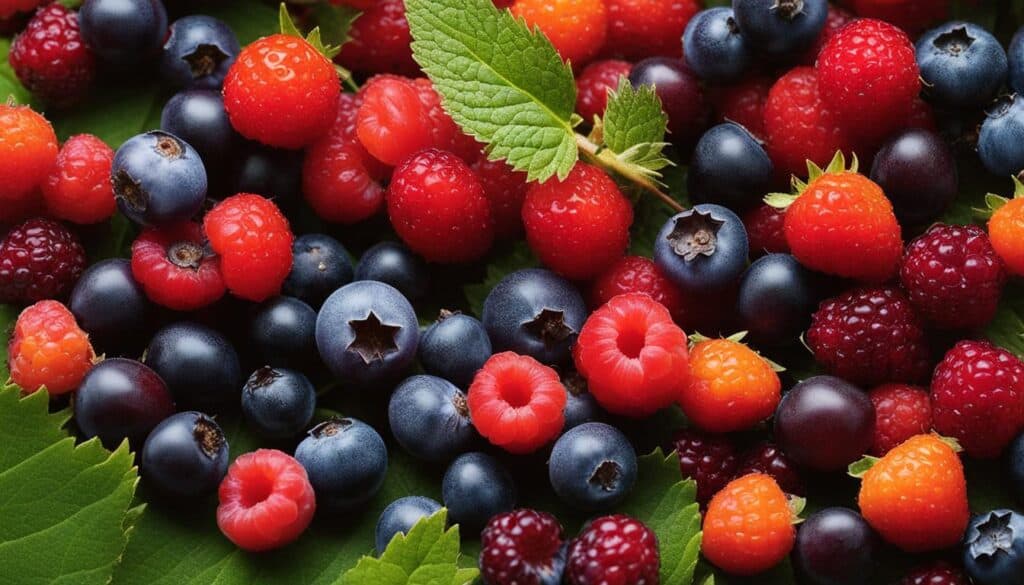
When it comes to fruits with one seed, berries stand out with their unique characteristics. These small, flavorful fruits are known for their soft or leathery epicarps, fleshy mesocarps, and thin, skin-like endocarps. Berries also contain small seeds that can easily pass through the digestive system, making them a convenient and nutritious snack. Some examples of berries that fall into this category include bananas, elderberries, gooseberries, grapes, persimmons, cucumbers, eggplants, kiwi, chili peppers, and tomatoes.
Another subtype of berries is pepos, which include squashes and melons. Pepos have a hard rind-like epicarp that protects the fleshy interior. Citrus fruits, such as oranges and lemons, are also considered berries, with their tough, oily rind providing a protective layer. Other fruit varieties with one seed include drupes, like mangos, cherries, pears, plums, and coffee “berries,” which have a hard endocarp surrounding a fleshy mesocarp.
Caryopses, like grains such as wheat, rice, corn, and barley, are another type of fruit with a single seed. These fruits have a pericarp fused with the seed, making them distinct from other single-seeded fruits. Pomes, including apples and pears, have their seeds clustered in the center of the fruit, protected by the fruit’s flesh.
The Unique Characteristics of Berries and Other Fruit Varieties
| Berry Type | Characteristics |
|---|---|
| Berries | Soft or leathery epicarp, fleshy mesocarp, and thin endocarp; small seeds |
| Pepos | Hard rind-like epicarp; fleshy interior |
| Citrus Fruits | Tough, oily rind |
| Drupes | Hard endocarp; fleshy mesocarp |
| Caryopses | Pericarp fused with the seed |
| Pomes | Seeds clustered in the center of the fruit |
Exploring the unique characteristics of berries and other fruit varieties allows us to appreciate the diverse wonders of nature. Each fruit type has its own distinct features, making them both visually appealing and nutritionally beneficial. Whether you’re enjoying a juicy grape, a tangy tomato, or a sweet persimmon, the single seed within these fruits adds to their flavor and nutritional value. So, next time you bite into a berry or another fruit with one seed, take a moment to savor its unique characteristics and the marvels of nature they represent.
The Fascinating World of Fruits with Multiple Seeds
Fruits with multiple seeds offer a captivating glimpse into the diversity of nature’s creations. These fruits, which include aggregates and multiple fruits, showcase unique characteristics and flavors. Let’s explore the fascinating world of fruits with multiple seeds and discover the wonders they hold.
The Marvel of Aggregate Fruits
Aggregate fruits, such as raspberries and blackberries, are a delight for both the eyes and the taste buds. These fruits develop from multiple pistils in each flower, resulting in the formation of multiple small berries clustered together. Each tiny berry encapsulates its own set of seeds, creating a visually stunning display of nature’s abundance.
The Intricacy of Multiple Fruits
Pineapples provide a perfect example of multiple fruits. They are formed by a group of individual flowers that fuse together as they grow, ultimately creating one large fruit. Each small flower contributes its own set of seeds to the collective fruit, forming a sweet and juicy treat for us to enjoy.
“Aggregate and multiple fruits are a testament to the intricate and complex processes that govern fruit development,” says Dr. Botanist.
| Fruit | Type | Seed Characteristics |
|---|---|---|
| Raspberries | Aggregate Fruit | Multiple small berries with individual seeds |
| Blackberries | Aggregate Fruit | Clusters of small berries containing individual seeds |
| Pineapples | Multiple Fruit | Fused flowers creating a single fruit with multiple seeds |
Fruits with multiple seeds are not only fascinating from a botanical perspective, but they also provide us with a diverse range of flavors and textures to explore. Whether we indulge in the juicy sweetness of raspberries and blackberries or savor the tropical goodness of pineapples, these fruits with multiple seeds offer a delightful culinary experience.
The Importance of Seeds in Fruits
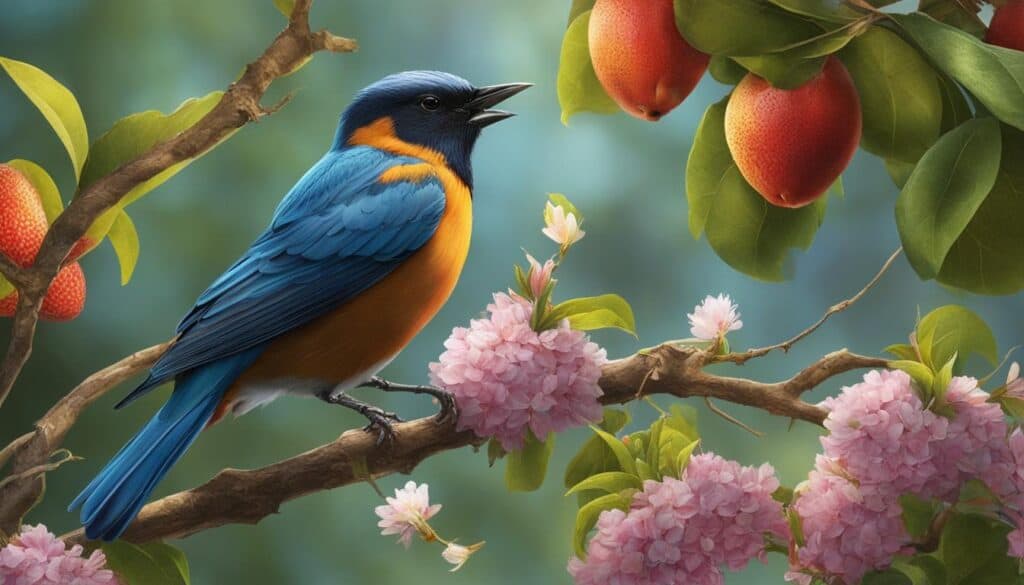
Fruits are not only delicious and nutritious, but they also play a vital role in the survival and reproduction of plants. The primary function of fruits is to ensure the dispersal of seeds. By enticing animals to eat them, fruits can effectively spread their seeds to new locations, increasing the chances of successful germination and the establishment of new plant populations.
Various plants employ different strategies for seed production and dispersal. Some fruits, like strawberries, produce many tiny seeds, while others, like avocados, focus on producing one large seed. This diversity in seed production allows plants to adapt to their specific environments and maximize their reproductive success.
Seeds not only contribute to the survival of plant species, but they also provide essential nutrients and health benefits to consumers. Fruits with one seed, such as bananas, grapes, and tomatoes, are rich in vitamins, minerals, fiber, and antioxidants. Including these single-seeded fruits in your diet can support overall health and contribute to a well-rounded and nutritious eating plan.
In summary, the presence of seeds in fruits is crucial for plant reproduction and survival. Fruits entice animals to eat them, aiding in seed dispersal. Different plants employ various strategies for seed production, resulting in fruits with varying numbers of seeds. Additionally, consuming fruits with one seed provides essential nutrients and health benefits. So next time you enjoy a delicious fruit, remember the vital role that seeds play in its existence.
Table: Examples of Fruits with Single Seeds and their Nutritional Benefits
| Fruit | Single Seed | Nutritional Benefits |
|---|---|---|
| Bananas | Yes | High in potassium, vitamin C, and dietary fiber |
| Grapes | Yes | Contain antioxidants, vitamins, and minerals |
| Tomatoes | Yes | Rich in lycopene, vitamin C, and other beneficial compounds |
The Role of Pollination in Fruit Development

Pollination is a crucial process in the development of fruits. While some plants can self-pollinate, many fruit trees rely on external agents such as wind, birds, insects, and other animals to transfer pollen between flowers. Cross-pollination, where pollen from one plant fertilizes another plant, plays a significant role in creating diversity among fruit types and contributing to the variation in seed numbers.
Pollination occurs when pollen grains are transferred from the anther of a flower’s male reproductive organ (stamen) to the stigma of the female reproductive organ (pistil). This transfer of pollen triggers the fertilization process, leading to the formation of fruit and seed development. Without successful pollination, fruit formation and seed production would be severely limited, impacting both plant reproduction and the availability of fruits for consumption.
The fascinating aspect of pollination is its intricate partnership between plants and pollinators. As pollinators visit flowers in search of nectar or pollen, they inadvertently transfer pollen from one flower to another. This mutualistic relationship benefits both parties, as pollinators receive food rewards while facilitating the reproduction of flowering plants. In turn, fruits develop, providing nourishment and a means for plants to disperse their seeds to new locations.
The role of pollination in fruit development goes beyond the creation of diverse fruit types. It also influences the genetic makeup of fruits, ensuring better adaptability and resilience to environmental changes. By promoting genetic recombination through cross-pollination, plants can potentially produce offspring with advantageous traits that enhance their chances of survival in different habitats.
The Importance of Cross-Pollination
Cross-pollination, especially in fruit trees, offers several advantages. It promotes genetic diversity, leading to stronger and healthier plants. Cross-pollination also increases fruit yield and quality by ensuring adequate and efficient transfer of pollen between different varieties. Additionally, some fruit trees, like apples and pears, require cross-pollination to produce any fruit at all. Therefore, creating a suitable environment to attract pollinators and encourage cross-pollination is vital for successful fruit production.
In conclusion, pollination plays a crucial role in fruit development, promoting genetic diversity, ensuring seed production, and influencing the ultimate flavors and qualities of fruits. Understanding the intricacies of pollination and the beneficial relationship between plants and pollinators enhances our appreciation for the wonders of nature’s bounty.
Exploring the Varieties of Single-Seeded Fruits
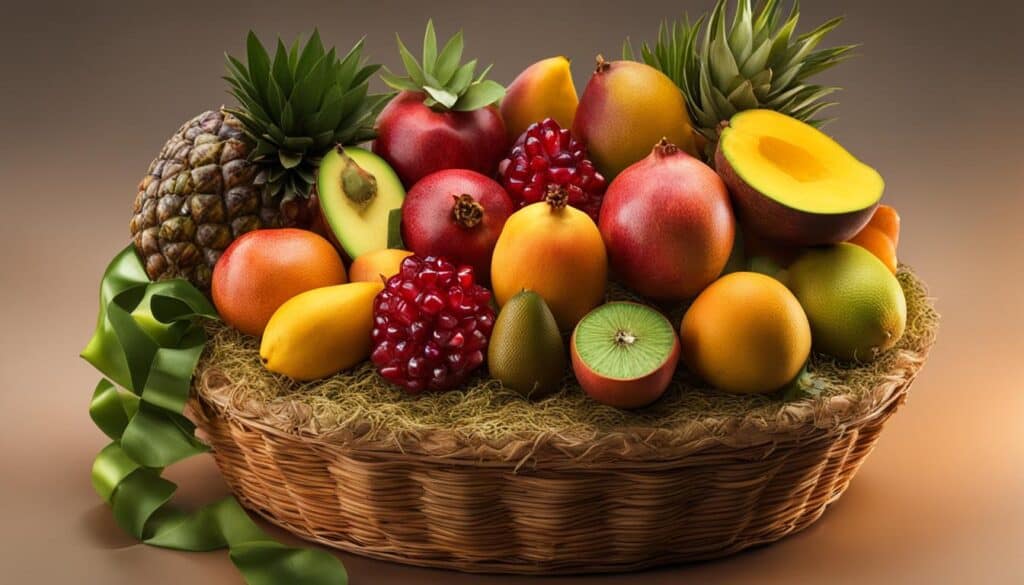
In fruit gift baskets or online fruit orders, you can find a variety of fruits with one seed. Some options include Navel Oranges, Rio Ruby™ Red Grapefruit, and King Comice Pears. These fruits may contain one or more seeds, depending on the specific variety. For example, stone fruits like peaches and cherries typically have only one seed, while berries like strawberries have many tiny seeds on the exterior.
| Fruit | Number of Seeds |
|---|---|
| Navel Oranges | 1-5 seeds |
| Rio Ruby™ Red Grapefruit | 10-15 seeds |
| King Comice Pears | 1-3 seeds |
Whether you’re looking for a refreshing citrus treat, a tangy and juicy grapefruit, or a sweet and succulent pear, these single-seeded fruits offer a delightful eating experience. The number of seeds in each fruit can vary, but they all share the characteristic of having a single seed at their core. These fruits are not only delicious but also provide essential nutrients to support a healthy lifestyle.
“I love ordering fruit gift baskets because they always contain a variety of single-seeded fruits. It’s a great way to try different flavors and enjoy the goodness of nature’s bounty!” – Sarah
When it comes to fruit gift baskets or online fruit orders, the options are endless. You can choose from a wide selection of single-seeded fruits to create a personalized gift or simply indulge in a healthy and tasty snack. Whether you’re treating yourself or surprising someone special, these fruit gift baskets are sure to bring joy and satisfaction.
So why wait? Explore the varieties of single-seeded fruits and savor the richness of flavor and nutrition they offer. Order a fruit gift basket today and experience the delight of nature’s perfect creation!
The Biology and Nutrition of Fruits with Seeds
Fruits with one seed are not only delicious but also incredibly nutritious. These single-seeded fruits offer a wide range of essential vitamins, minerals, fiber, and antioxidants that contribute to overall health and well-being. Incorporating fruits with one seed into your diet can provide a variety of health benefits and support a balanced lifestyle.
One such example is bananas, which are rich in potassium, vitamin B6, and dietary fiber. Potassium plays a crucial role in maintaining proper heart and muscle function, while vitamin B6 supports brain development and function. The fiber content in bananas helps promote healthy digestion and can aid in weight management.
Grapes, another popular fruit with one seed, are packed with antioxidants like resveratrol, which has been linked to potential health benefits such as reducing inflammation and protecting against certain chronic diseases. Additionally, grapes are a good source of vitamin C, vitamin K, and dietary fiber.
“The nutritional value of single-seeded fruits goes beyond their delicious taste. They provide key nutrients that support our overall health and well-being.”
Tomatoes, often considered a vegetable but botanically a fruit, are a fantastic source of lycopene—an antioxidant that has been associated with a reduced risk of heart disease and certain types of cancer. They also provide vitamins A and C, potassium, and fiber. Incorporating tomatoes into your diet can contribute to a healthy immune system and promote skin health.
| Fruit | Nutritional Benefits |
|---|---|
| Bananas | Rich in potassium, vitamin B6, and dietary fiber |
| Grapes | High in antioxidants, vitamin C, vitamin K, and dietary fiber |
| Tomatoes | Excellent source of lycopene, vitamins A and C, potassium, and fiber |
By incorporating fruits with one seed like bananas, grapes, and tomatoes into your daily diet, you can enjoy their delicious flavors while reaping their nutritional benefits. Whether eaten fresh, added to smoothies, or used in various culinary preparations, these single-seeded fruits contribute to a well-rounded and healthy eating plan. So, indulge in nature’s gift and embrace the goodness of single-seeded fruits!
The Fascination of Fruit Biology
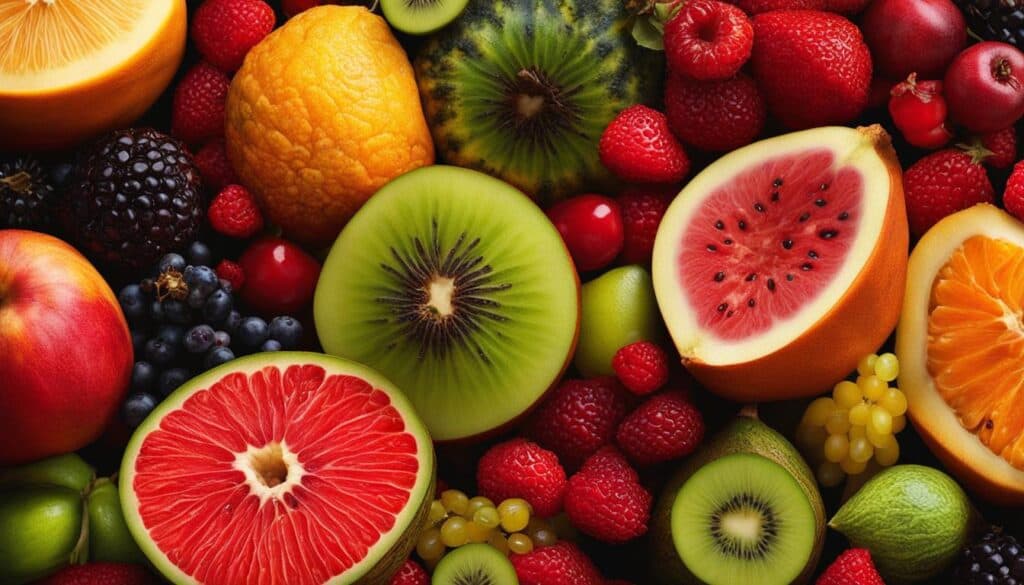
When it comes to the biology of fruits, there is an inherent fascination in their complex processes and unique characteristics of reproduction. From the anatomy of berries to the diverse structures of stone fruits and nuts, fruits showcase the ingenuity and diversity of the plant kingdom. Understanding the intricate details of fruit development and how they fulfill their role in plant survival adds to our appreciation of the wonders of nature.
One of the intriguing aspects of fruit biology is the wide variety of reproductive strategies employed by different plants. Berries, such as grapes and tomatoes, develop from single, mono-ovary flowers and contain small seeds that can be easily dispersed. Stone fruits like peaches and cherries have a hard endocarp that protects a single seed. Nuts, like almonds and walnuts, have a dry, hard epicarp, mesocarp, and endocarp, ensuring the protection and dispersal of their seeds.
Another captivating facet of fruit biology is the role of pollination in fruit development. While some plants can self-pollinate, many fruit trees rely on external factors such as wind, birds, insects, and other animals to transfer pollen between flowers. Cross-pollination, where pollen from one plant fertilizes another plant’s female parts, contributes to the diversity of fruit types and the variation in seed numbers among different fruits.
The fascinating world of fruit biology reveals the intricacies of seed production, seed dispersal, and the diverse reproductive strategies employed by different fruits. Exploring the unique characteristics of various fruits and their role in plant survival deepens our understanding of the complexity and beauty of the natural world.
Ordering Fruit Gifts and Enjoying Nature’s Gems
When it comes to gifting or treating yourself, fruit gift baskets are a delightful choice. They offer a variety of single-seeded fruits that are not only delicious but also packed with essential nutrients. Ordering fruit gift baskets online provides convenience and the opportunity to explore different fruits from the comfort of your own home.
One of the benefits of ordering fruit gift baskets is the wide selection available. You can choose from fruits like Navel Oranges, Rio Ruby Red Grapefruit, and King Comice Pears, each offering its own unique flavor and nutritional profile. Whether you prefer the sweet juiciness of oranges, the tanginess of grapefruit, or the buttery texture of pears, there is something for everyone.
Another advantage of online fruit orders is the freshness and quality of the fruits. Reputable suppliers take great care in selecting and packing the fruits to ensure they arrive in optimal condition. This means you can enjoy nature’s gems at their peak ripeness, bursting with flavor and nutrients.
So why not indulge in the goodness of single-seeded fruits by ordering a fruit gift basket today? With a wide variety to choose from and the convenience of online ordering, you can savor the wholesome flavors and reap the health benefits of these nature’s gems.
Benefits of Online Fruit Orders
- Convenience: You can browse and order fruits from the comfort of your own home, without the need to visit a physical store.
- Wide variety: Online fruit orders offer a wide selection of single-seeded fruits, allowing you to explore different flavors and nutritional profiles.
- Freshness guarantee: Reputable suppliers ensure that the fruits are fresh and of high quality, so you can enjoy them at their best.
- Gift options: Fruit gift baskets make a thoughtful and healthy gift for various occasions, allowing you to share the joy of nature’s bounty with others.
- Health benefits: Single-seeded fruits are packed with essential nutrients, vitamins, minerals, and antioxidants that contribute to a well-rounded diet and support overall health.
Conclusion
Fruits with one seed offer a delightful and nutritious experience. From the juicy sweetness of berries to the satisfying crunch of nuts, these single-seeded fruits come in a variety of flavors, textures, and nutritional profiles. Whether you’re looking for a healthy snack or a vibrant addition to your meals, fruits with one seed provide a delicious and wholesome option.
Indulge in the natural goodness of fruits like bananas, grapes, and tomatoes. These single-seeded fruits contain essential vitamins, minerals, and antioxidants that support overall health. With their vibrant colors and refreshing tastes, they add a burst of flavor and nutrition to your diet.
Next time you’re craving a delicious and nutritious treat, reach for fruits with one seed. From the convenience of online fruit orders to the joy of receiving a fruit gift basket, these fruits are readily available to satisfy your cravings and provide a dose of nature’s bounty. Embrace the delights of fruits with one seed and discover the wonders they have to offer.
FAQ
What are some examples of fruits with one seed?
Examples of fruits with one seed include bananas, elderberries, gooseberries, grapes, persimmons, cucumbers, eggplants, kiwi, chili peppers, and tomatoes.
How are fruits categorized based on their anatomy?
Fruits can be categorized as berries, drupes (stone fruits), nuts, caryopses, pomes, aggregates, or multiple fruits, depending on their anatomy and the type of flowers they derive from.
What are the unique characteristics of berries and other fruit varieties with one seed?
Berries and other fruit varieties with one seed, like cucumbers and kiwi, have soft or leathery exteriors, fleshy interiors, and small seeds that can be easily digested.
How do fruits with multiple seeds differ from those with one seed?
Fruits with multiple seeds, like raspberries and pineapples, are formed from multiple pistils or multiple blossoms, resulting in multiple berries or one large fruit, respectively.
Why do fruits have seeds?
The primary function of fruits is to ensure the survival of the plant by dispersing seeds. Fruits entice animals to eat them, thereby releasing the seeds or carrying them away for distribution.
What role does pollination play in fruit development?
Pollination, which occurs through the transfer of pollen between flowers, is crucial for fruit development. Most fruit trees require assistance from wind, birds, insects, or other animals for successful pollination.
What are some examples of single-seeded fruits that can be found in fruit gift baskets or online fruit orders?
Some examples of single-seeded fruits that can be found in fruit gift baskets or online fruit orders include Navel Oranges, Rio Ruby Red Grapefruit, and King Comice Pears.
Do fruits with one seed offer any health benefits?
Yes, fruits with one seed, such as bananas, grapes, and tomatoes, are not only delicious but also packed with essential nutrients. They provide vitamins, minerals, fiber, and antioxidants that support overall health.
What makes the biology of fruit production and seed dispersal fascinating?
The biology of fruit production and seed dispersal showcases the diversity and ingenuity of plant life. It highlights the intricate details of how fruits develop and fulfill their role in plant survival.
How can I order fruit gifts and enjoy the variety of single-seeded fruits available?
You can order fruit gift baskets or purchase fruits online to explore the variety of single-seeded fruits. Gift baskets often include a selection of fruits like Navel Oranges, Rio Ruby Red Grapefruit, and King Comice Pears.

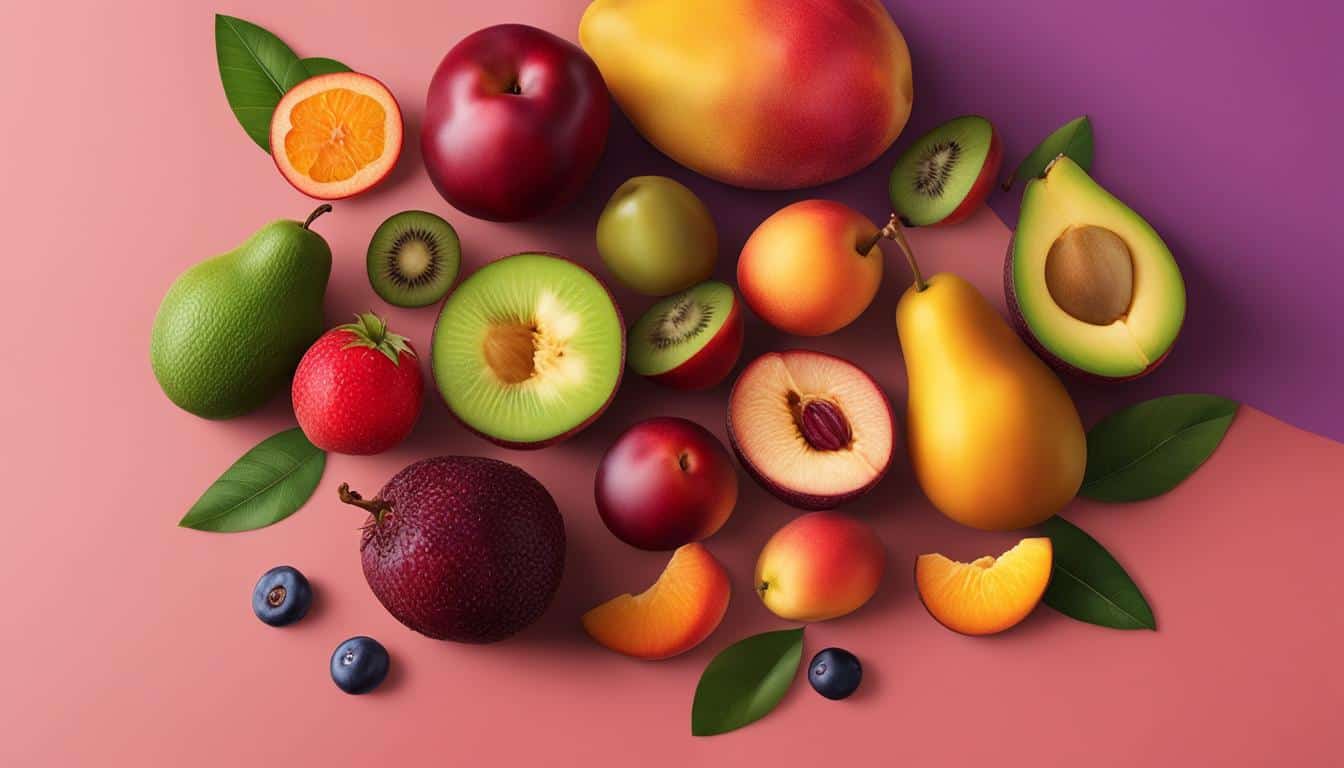



Leave a Reply